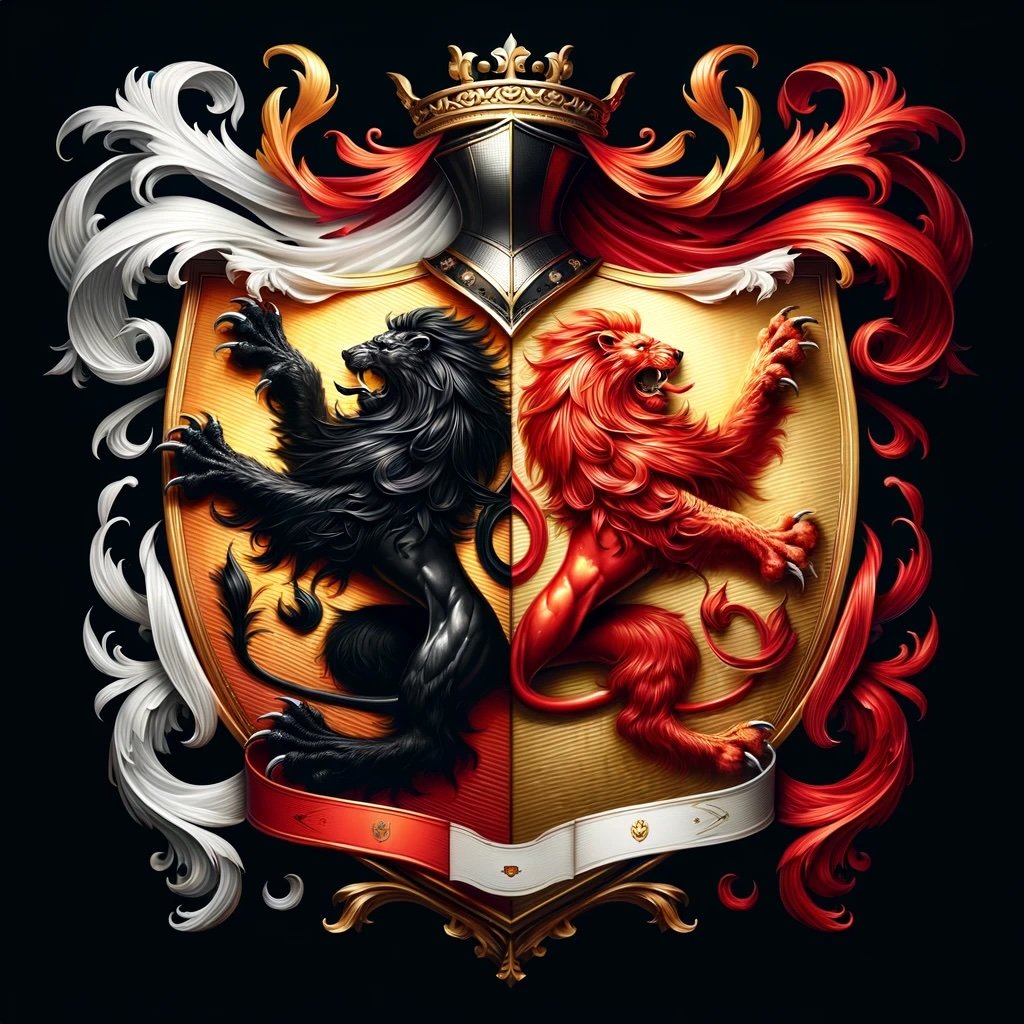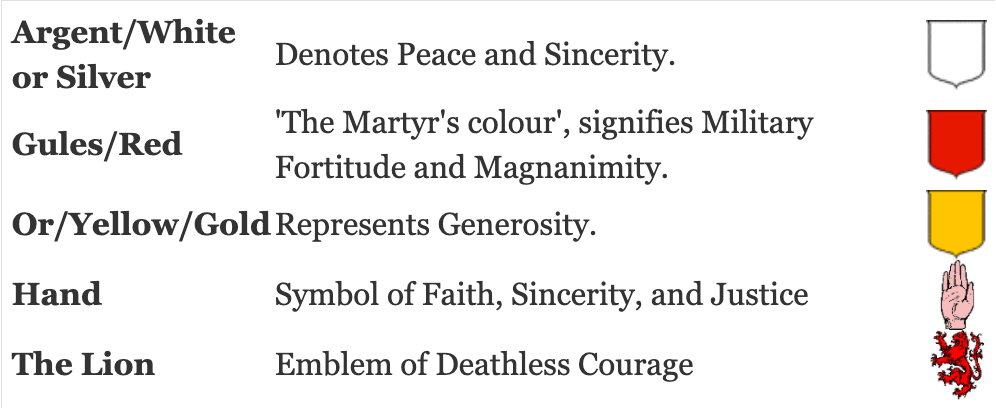
Daly (Ó Dálaigh)
"Deo et Regi Fidelis"
Daly Family
The Ó Dálaigh (Daly) family, originating from the 12th century in Ireland, were esteemed as a learned bardic family, with Cú Connacht Ó Dálaigh noted as Ireland's premier poetry professor. Renowned for their harp playing and poetic contributions, they produced significant literature, with Gofraidh Fionn Ó Dálaigh among the notable poets. The surname O'Daly and its variations trace back to this family, originating from the term 'descendant of Dálach,' meaning 'assemblyman' or 'councillor'. The decline of Gaelic nobility and bardic patronage in the 17th century diminished their prominence. Initially based in Westmeath, they claimed descent from Niall of the Nine Hostages, with a lineage tied to Irish kings and the royal courts. The Ó Dálaigh were key figures in bardic education, establishing schools in Ireland and Scotland, and held esteemed positions within Irish society. Despite their scholarly pursuits, many Ó Dálaigh members engaged in politics and conflict, reflecting the multifaceted roles of bards in medieval Ireland.
Family History
The Ó Dálaigh (Irish pronunciation for Daly) were a learned Irish bardic family who first came to prominence early in the 12th century, when Cú Connacht Ó Dálaigh was described as "The first Ollamh of poetry in all Ireland" (ollamh is the title given to university professors in Modern Irish).
"Harp of Cnoc I'Chosgair, you who bring sleep to eyes long sleepless; sweet subtle, plangent, glad, cooling grave. Excellent instrument with smooth gentle curve, trilling under red fingers, musician that has charmed us, red, lion-like of full melody. You who lure the bird from the flock, you who refresh the mind, brown spotted one of sweet words, ardent, wondrous, passionate." Gofraidh Fionn Ó Dálaigh. The modern Irish surnames O'Daly, Daly, Daley, Daily, Dailey and Dawley are derived from Ó Dálaigh.
Name Derivation
The surname Ó Dálaigh signifies 'descendant of Dálach,' rooted in the term dáil, which means "assembly;" akin to the Irish Parliament, Dáil Éireann, suggesting Dálach as "assemblyman" or "councillor." The Gaelic-speaking nobility's decline, marked by the Flight of the Earls in the 17th century, led to the bardic families' social decline, dependent on their patronage. This period witnessed the anglicization of Ó Dálaigh to various forms including Daly and Daley, signifying a significant transition in the socio-cultural landscape of Ireland, echoing the changes from an era of Gaelic dominion to a more anglicized influence. (The name Ó Dálaigh also changed, becoming anglicised to Daly, O'Daly, Dayley, Daley, Dailey or Dawley.)
Origins & Ancestry
Tracing back to the ancient heartlands of Tethba, now known as Westmeath, the Ó Dálaigh family's origins are deeply rooted in the Moyashel & Magheradernon baronies. This noble lineage, known as Corca Adaimh or 'Race of Adam,' claims its descent from the legendary Niall of the Nine Hostages, High King of Ireland around the 400s AD, through Máel Dúin mac Máele Fithrich of Cenél maic Ercae, a king of Ailech in Ulster. Among Máel Dúin's progeny were Fergal mac Máele Dúin, a high king, and Adamh, from whom the Ó Dálaighs descend. However, historical narratives sometimes confuse Adamh's lineage, suggesting he might be the son of another Máel Dúin, Fergal's son. The later generations saw Dálach, the namesake of the Ó Dálaigh surname and a testament to their esteemed kinship with the O'Neills and O'Donnells.
Gofraidh Fionn Ó Dálaigh, a notable figure within the family, traced their lineage to a 6th-century Dálach, a disciple of Saint and poet Colmán, the revered patron of Cloyne, who reportedly ascended to bishopric within the early Irish Church.
In Munster, the Ó Dálaighs were alternatively ascribed descent from the Eóganacht kings of Cashel, notably Aenghus, a king converted by St. Patrick. This Munster lineage, though less substantiated than the Northern ancestry, indicates an effort to harmonize the bardic family's origins with those of the local sovereigns they served. This rich tapestry of heritage underscores the Ó Dálaigh family's significant place within Irish history, bridging royal bloodlines and sacred traditions.
Renowned Bardic Legacy
"The exalted chiefs of Corca Adhamh, the Ó Dálaigh, eternally distinguished." The Ó Dálaigh lineage boasts a storied heritage as hereditary bards within various Irish royal courts, with several members attaining the prestigious title of Ard Ollamh, paralleling the High King of Ireland in societal stature. This esteemed position, along with the Chief Ollamh of Scotland title, underscored the significant cultural and political influence wielded by "The Ó Dálaigh," akin to the honor bestowed upon the Prince of Thomond as "The O'Brien."
The Ó Dálaigh clan's legacy includes the establishment of bardic schools across Ireland and Scotland, elevating the filid or "men of skill" to a noble standing within Irish society. Their mastery of Dán Díreach, a complex and revered poetry form, during the Late Medieval era, not only demonstrated their exceptional talent but also instilled a measure of fear and respect. Their poetic satires had the power to undermine the status of chieftains, reflecting the societal value placed on appearance and honor.
Beyond their poetic endeavors, the Ó Dálaigh were also chieftains of lands such as Corca Raidhe in Meath and Mhuintir Bháire in Cork, with their estates often gifted by royal patrons. These lands, regarded as sacred, remained untouched in conflicts, highlighting the profound respect for the bardic profession.
Moreover, the Ó Dálaigh's contributions were not limited to the secular realm; many were prominent ecclesiastics who infused their religious roles with poetic creativity. Their involvement in political and martial affairs sometimes led to tragic ends, epitomized by the fearsome Muireadhach Albanach Ó Dálaigh, whose legacy as a warrior poet remains a vivid testament to the multifaceted roles of bards in ancient Irish culture."The chiefs of high Corca Adhamh, O'Dalaigh of lasting renown". Many of the Ó Dálaigh were hereditary poets to the various Irish royal courts and a number of them held the post of Ard Ollamh (Chief Poet of Ireland). The Ard Ollamh ranked with the High King of Ireland in the social hierarchy and maintained his own court. More than one member of the Ó Dálaigh family held both this post and the post of Chief Ollamh of Scotland. The chief poet of the family was known as "The Ó Dálaigh" in the same manner that the Prince of Thomond was called "The O'Brien".



